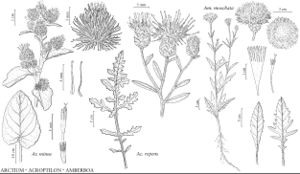Arctium
Sp. Pl. 2: 816. 1753.
Gen. Pl. ed. 5, 357. 1754.
| Taxon | Illustrator ⠉ | |
|---|---|---|
 | Arctium minus Acroptilon repens Amberboa moschata | John Myers John Myers John Myers |
Biennials or (monocarpic) perennials, 50–300 cm; herbage not spiny. Stems erect, openly branched, branches ascending. Leaves basal and cauline; long-petiolate; gradually smaller distally; blade margins entire or dentate (pinnately lobed or dissected), faces abaxially resin-gland-dotted, adaxially often tomentose. Heads discoid, in leafy-bracted racemiform to paniculiform or corymbiform arrays. (Peduncles 0 or 1–9 cm.) Involucres spheric to ovoid. Phyllaries many in 9–17 series, outer and mid narrowly linear, bases appressed, margins entire, apices stiffly radiating, hooked-spiny tipped, inner linear, ascending or erect, straight-tipped. Receptacles ± flat, epaleate, bearing subulate scales. Florets (5–) 20–40+; corollas pink to ± purple, glabrous or glandular-puberulent, tubes elongate, throats campanulate, lobes narrowly triangular, ± equal; anther bases tailed, apical appendages ovate, obtuse to acute; style-branches: fused portions distally hairy-ringed, distinct portions oblong, acute or obtuse. Cypselae obovoid, ± compressed, rough or ribbed, glabrous, attachment scars basal; pappi falling, of many bristles in 2–4 series. x = 18.
Distribution
Introduced; Eurasia, n Africa, widely worldwide
Discussion
Species 10 (3 in the flora).
At maturity the dry heads of Arctium species are readily caducous with the enclosed cypselae, and the hooked phyllary tips cling easily to fur or fabrics. Animal dispersal is a major factor in the spread of burdock species across North America. The burs are a major problem when they become entangled in the wool of sheep and fur of dogs and other animals.
Published chromosome reports for Arctium other than n = 18 are probably in error because of difficulty in interpretation of somatic chromosomes (R. J. Moore and C. Frankton 1974).
Selected References
Lower Taxa
Key
| 1 | Heads usually sessile to short-pedunculate in racemiform or paniculiform clusters. | Arctium minus |
| 1 | Heads usually long-pedunculate in corymbiform clusters | > 2 |
| 2 | Involucre 2.5–4 cm diam.; phyllary apices glabrous or loosely cobwebby; corollas glabrous | Arctium lappa |
| 2 | Involucre 1.5–2.5 mm diam.; phyllary apices densely cobwebby; corollas minutely glandular-puberulent | Arctium tomentosum |
"fine" is not a number.